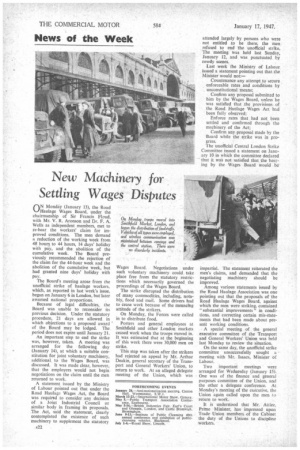New Machinery for Settling Wages Disputes O N Monday (January 13),
Page 24

If you've noticed an error in this article please click here to report it so we can fix it.
the Road Haulage Wages Board, under the chairmanship of Sir Francis Floud, with Mr. V. R. Aronson and Dr. F. A. Wells as independent members, met to re-hear the workers' claim for improved conditions. The men demand a reduction of the working week from 48 hours to 44 hours, 14 days' holiday with pay, and the abolition of the cumulative week. The Board previously recommended the rejection of the claim for the 44-hour week and the abolition of the cumulative week, but had granted nine days' holiday with pay.
The Board's meeting arose from the unofficial strike of haulage workers, which, as reported in last week's issue, began on January 6 in London, but later assumed national proportions.
Because of legal difficulties, the Board was unable to reconsider its previous decision. Under the statutory procedure, 21 days are allowed in which objections to a proposed award of the Board may be lodged. The period does not expire until January 21.
An important step to end the strike was, however, taken. A meeting was arranged for the following day (January 14), at which a suitable constitution for joint voluntary machinery, additional to the Wages Board, was discussed. It was made clear, however, that the employers would not begin negotiations on the claim until the men returned to work.
A statement issued by the Ministry of Labour pointed out that under the Road Haulage Wages Act, the Board was required to consider any decision of a Joint Industrial Council or similar body in framing its proposals. The Act, said the statement, clearly contemplated the existence of such machinery to supplement the statutory Wages Board. Negotiations under such voluntary machinery could take place free from the statutory restrictions which necessarily governed the proceedings of the Wages Board.
The strike disrupted the distribution of many commodities, including, notably, food and mail. Some drivers had to cease work because of the menacing attitude of the strikers.
On Monday, the Forces were called in to distribute food.
Porters and general employees at Smithfield and other London markets ceased work when the troops moved in. It was estimated that at the beginning of this week there were 30,000 men on strike.
This step was taken after the strikers had rejected an appeal by Mr. Arthur Deakin, general secretary of the Transport and General Workers' Union, to return to work. At an alleged delegate meeting of the Union, which was attended largely by persons who were not entitled to be there, the men refused to end the unofficial strike. The meeting Was held last Sunday, January 12, and was punctuated by rowdy scenes.
Last week the Ministry of Labour issued a statement pointing out that the Minister would not:—
Countenance any attempt to secure enforceable rates and conditions by unconstitutional means; Confirm any proposal submitted to him by the Wages Board, unless he was satisfied that the provisions of the Road Haulage Wages Act had been fully observed; Enforce rates that had not been settled and confirmed through the machinery of the Act; Confirm any proposal made by the Board while the strike was in progress.
The unofficial Central London Strike Committee issued a statement on January 10 in which the committee declared that it was not satisfied that the hearing by the Wages Board would be impartial. The statement reiterated the men's claims, and demanded that the negotiating machinery should be improved.
Among various statements issued by the Road Haulage Association was one pointing out that the proposals of the Road Haulage Wages Board, against which the men were striking, contained "substantial improvements" in conditions, and correcting certain mis-statements that had been made about present working conditions.
A special meeting of the general executive committee of the Transport and General Workers' Union was held last Monday to review the situation.
On the same day, the unofficial strike committee unsuccessfully sought a meeting with Mr. Isaacs, Minister of Labour.
Two important meetings were arranged for Wednesday (January 15). One was of the finance and general purposes committee of the Union, and the other a delegate conference. At Monday's meeting of the executive, the Union again called upon the men to return to work.
It is understood that Mr. Attlee, Prime Minister, has impressed upon Trade Union members of the Cabinet the duty of the Unions to discipline workers.












































































